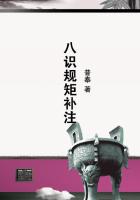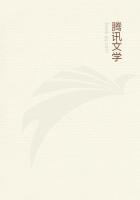34 It is true, what we want is to make right reason act on individual reason, the reason of individuals; all our search for authority has that for its end and aim. The Daily News says, I observe, that all my argument for authority 'has a non-intellectual root;' and from what I know of my own mind and its poverty I think this so probable, that I should be inclined easily to admit it, if it were not that, in the first place, nothing of this kind, perhaps, should be admitted without examination;and, in the second, a way of accounting for the charge being made, in this particular instance, without good grounds, appears to present itself. What seems to me to account here, perhaps, for the charge, is the want of flexibility of our race, on which I have so often remarked. I mean, it being admitted that the conformity of the individual reason of the fanatical Protestant or the popular rioter with right reason is our true object, and not the mere restraining them, by the strong arm of the State, from Papist-baiting or railing-breaking,--admitting this, we English have so little flexibility that we cannot readily perceive that the State's restraining them from these indulgences may yet fix clearly in their minds that, to the collective nation, these indulgences appear irrational and unallowable, may make them pause and reflect, and may contribute to bringing, with time, their individual reason into harmony with right reason. But in no country, owing to the want of intellectual flexibility above mentioned, is the leaning which is our natural one, and, therefore, needs no recommending to us, so sedulously recommended, and the leaning which is not our natural one, and, therefore, does not need dispraising to us, so sedulously dispraised, as in ours.
To rely on the individual being, with us, the natural leaning, we will hear of nothing but the good of relying on the individual; to act through the collective nation on the individual being not our natural leaning, we will hear nothing in recommendation of it. But the wise know that we often need to hear most of that to which we are least inclined, and even to learn to employ, in certain circumstances, that which is capable, if employed amiss, of being a danger to us.
35 Elsewhere this is certainly better understood than here. In a recent number of the Westminster Review, an able writer, but with precisely our national want of flexibility of which I have been speaking, has unearthed, I see, for our present needs, an English translation, published some years ago, of Wilhelm von Humboldt's book, The Sphere and Duties of Government . Humboldt's object in this book is to show that the operation of government ought to be severely limited to what directly and immediately relates to the security of person and property. Wilhelm von Humboldt, one of the most beautiful souls that have ever existed, used to say that one's business in life was first to perfect oneself by all the means in one's power, and secondly to try and create in the world around one an aristocracy, the most numerous that one possibly could, of talents and characters. He saw, of course, that, in the end, everything comes to this,--that the individual must act for himself, and must be perfect in himself; and he lived in a country, Germany, where people were disposed to act too little for themselves, and to rely too much on the Government.
But even thus, such was his flexibility, so little was he in bondage to a mere abstract maxim, that he saw very well that for his purpose itself, of enabling the individual to stand perfect on his own foundations and to do without the State, the action of the State would for long, long years be necessary. And soon after he wrote his book on The Sphere and Duties of Government, Wilhelm von Humboldt became Minister of Education in Prussia; and from his ministry all the great reforms which give the control of Prussian education to the State,--the transference of the management of public schools from their old boards of trustees to the State, the obligatory State-examination for schoolmasters, and the foundation of the great State-University of Berlin,--take their origin. This his English reviewer says not a word of. But, writing for a people whose dangers lie, as we have seen, on the side of their unchecked and unguided individual action, whose dangers none of them lie on the side of an over-reliance on the State, he quotes just so much of Wilhelm von Humboldt's example as can flatter them in their propensities, and do them no good; and just what might make them think, and be of use to them, he leaves on one side. This precisely recalls the manner, it will be observed, in which we have seen that our royal and noble personages proceed with the Licensed Victuallers.
36 In France the action of the State on individuals is yet more preponderant than in Germany; and the need which friends of human perfection feel for what may enable the individual to stand perfect on his own foundations is all the stronger. But what says one of the staunchest of these friends, M. Renan, on State action; and even State action in that very sphere where in France it is most excessive, the sphere of education?
Here are his words:--'A Liberal believes in liberty, and liberty signifies the non-intervention of the State. But such an ideal is still a long way off from us, and the very means to remove it to an indefinite distance would be precisely the Slate's withdrawing its action too soon .' And this, he adds, is even truer of education than of any other department of public affairs.
37 We see, then, how indispensable to that human perfection which we seek is, in the opinion of good judges, some public recognition and establishment of our best self, or right reason. We see how our habits and practice oppose themselves to such a recognition, and the many inconveniences which we therefore suffer. But now let us try to go a little deeper, and to find, beneath our actual habits and practice, the very ground and cause out of which they spring. UTEL: Culture and Anarchy CHAPTER IV.















